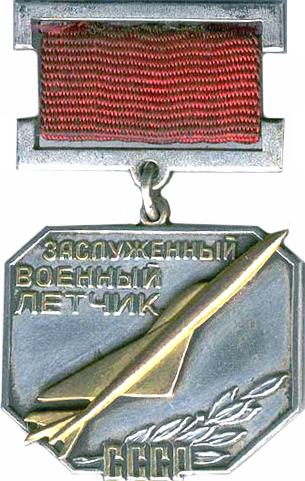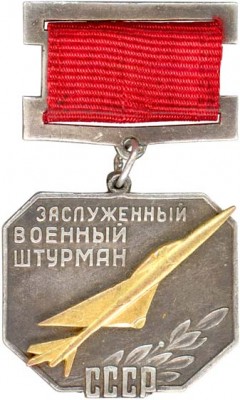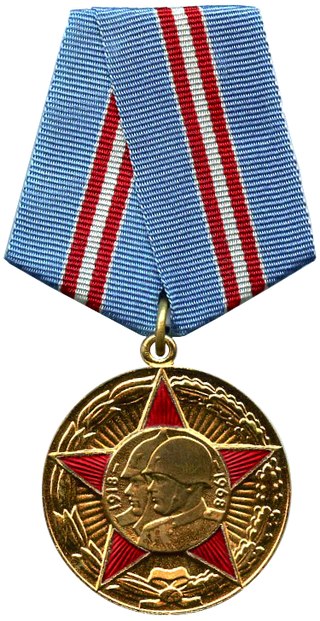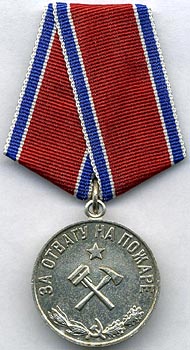
Awards and decorations of the Soviet Union are decorations from the former Soviet Union that recognised achievements and personal accomplishments, both military and civilian. Some of the awards, decorations, and orders were discontinued after the dissolution of the Soviet Union, while others are still issued by the Russian Federation as of 2023. Many of the awards were simply reworked in the Russian Federation, such as the transition of Hero of the Soviet Union to Hero of the Russian Federation, and Hero of Socialist Labour to Hero of Labour of the Russian Federation. A wide range of Soviet awards and decorations cover the extensive and diverse period of history from 1917 to 1991.

The Order of Alexander Nevsky is an order of merit of the Russian Federation named in honour of saint Alexander Nevsky (1220–1263) and bestowed to civil servants for twenty years or more of highly meritorious service. It was originally established by the Soviet Union as a military honour during World War II, more precisely by Decree of the Presidium of the Supreme Soviet of the USSR of July 29, 1942. Its statute was amended by Decree of the Presidium of the Supreme Soviet of the USSR of February 26, 1947. It bears a similar name to the Order of Saint Alexander Nevsky which had been established by Empress Catherine I of Russia in 1725, and continued to be bestowed by the heads of the House of Romanov after the 1917 Russian Revolution. The Order of Alexander Nevsky was reinstated by the Soviet Union, minus the words "Imperial" and "Saint", for award to officers of the army for personal courage and resolute leadership. The Order was retained by the new Russian Federation following the dissolution of the USSR by Decision of the Supreme Soviet of the Russian Federation 2557-I of March 20, 1992 but was never awarded. The September 7, 2010 Decree №1099 of the President of the Russian Federation redesigned the badge of the Order closer to pre-1917 imperial model and amended the statute of the Order making it a purely civilian award.

Orders, decorations and medals of Albania are state decorations regulated and bestowed by the Republic of Albania.

The Medal "Veteran of Labour" was a civilian labour award of the Soviet Union established on January 18, 1974 by Decree of the Presidium of the Supreme Soviet of the USSR to honour workers for many years of hard work in the national economy, sciences, culture, education, healthcare, government agencies and public organizations. Although it only had a relatively short eighteen years of existence, it was awarded nearly forty million times. Its regulations were detailed and approved by decree number 5999-VIII of May 20, 1974. Its statute was amended by multiple successive decrees of the Presidium of the Supreme Soviet of the USSR, first on June 8, 1977, then on August 12, 1983 and lastly on December 28, 1987. The medal ceased to be awarded following the December 1991 dissolution of the Soviet Union.

The Medal "For Courage" or Medal "For Valour" is a state decoration of the Russian Federation that was retained from the Soviet awards system following the dissolution of the USSR.

The Honorary Title "Honoured Military Pilot of the USSR" was a state military award of the Soviet Union established on January 26, 1965, by Decree of the Presidium of the Supreme Soviet No. 3230-VI to recognise and reward excellence in military aviation. It was abolished on August 22, 1988, by decree of the Presidium of the Supreme Soviet No. 9441-XI.

The Honorary Title "Merited Military Navigator of the USSR" was a state military award of the Soviet Union established on January 26, 1965 by Decree of the Presidium of the Supreme Soviet № 3230-VI to recognise and reward excellence in military aviation. It was abolished on August 22, 1988 by Decree of the Presidium of the Supreme Soviet № 9441-XI.

The Honorary Title "Merited Test Navigator of the USSR" was a military and civilian state award of the Soviet Union. It was established on August 14, 1958, by Decree of the Presidium of the Supreme Soviet No. 2523-X, to recognise courage and outstanding service in experimental aviation. Its statute was confirmed on August 22, 1988, by Decree of the Presidium of the Supreme Soviet No. 9441-XI. The title ceased to be awarded following the December 1991 dissolution of the Soviet Union.

The Honorary Title "Honoured Pilot of the USSR" was a state civilian award of the Soviet Union established on September 30, 1965 by Decree of the Presidium of the Supreme Soviet of the USSR № 3993-VI to recognise excellence in civilian aviation. It was abolished on August 22, 1988 by Decree of the Presidium of the Supreme Soviet № 9441-XI.

The Honorary Title "Honoured Navigator of the USSR" was a civilian state award of the Soviet Union established on September 30, 1965 by Decree of the Presidium of the Supreme Soviet of the USSR № 3993-VI to recognise excellence in civilian aviation. It was abolished on August 22, 1988 by Decree of the Presidium of the Supreme Soviet № 9441-XI.

The Honorary Title "Honoured Inventor of the USSR" was a state award of the Soviet Union established on 28 December 1981 by Decree of the Presidium of the Supreme Soviet № 6277-X to recognise and reward innovations in technology. Its statute was later confirmed on 22 August 1988 by Decree of the Presidium of the Supreme Soviet № 9441-XI. It ceased to be awarded following the December 1991 dissolution of the Soviet Union and was replaced in 1992 by the Honorary Title "Honoured Inventor of the Russian Federation".

The Honorary Title "Honoured Test Pilot of the USSR" was a state award of the Soviet Union established on August 14, 1958 by Decree of the Presidium of the Supreme Soviet № 2523-X to recognise courage and excellence of military and civilian test pilots in flight research and testing of aircraft. Its statute was confirmed on August 22, 1988 by Decree of the Presidium of the Supreme Soviet № 9441-XI. The title ceased to be awarded following the December 1991 dissolution of the Soviet Union.

The Medal "For Distinction in Military Service" was a military decoration awarded in two classes by the Soviet Union and later by the Russian Federation, to deserving military personnel of the Ministry of Defense, of internal troops and of border troops of both the USSR and Russian Federation. It was gradually phased out following the dissolution of the USSR being replaced by various ministerial awards.

The Medal "For Strengthening Military Cooperation" was a military award of the Soviet Union established on May 25, 1979, by Decree of the Presidium of the Supreme Soviet. Its statute was later confirmed and slightly amended by Decree of the Presidium of the Supreme Soviet No. 2523-X of July 18, 1980. It was bestowed to recognise outstanding cooperation between the different services and the different armed forces of the various Warsaw Pact countries or of any other friendly socialist state.

The Jubilee Medal "50 Years of the Armed Forces of the USSR" was a state military commemorative medal of the Soviet Union established on December 26, 1967 by decree of the Presidium of the Supreme Soviet of the USSR to denote the fiftieth anniversary of the creation of the Soviet Armed Forces. Its statute was amended on three occasions, by decrees of the Presidium of the Supreme Soviet of the USSR of February 22, 1968, of December 19, 1969, and of July 18, 1980.

The Jubilee Medal "60 Years of the Armed Forces of the USSR" was a state military commemorative medal of the Soviet Union established and bestowed to military personnel to denote the sixtieth anniversary of the creation of the armed forces of the Soviet Union. It was established on January 28, 1978 by decree of the Presidium of the Supreme Soviet of the USSR. Its statute was amended by decree of the Presidium of the Supreme Soviet of the USSR on July 18, 1980.

The Medal "For Distinguished Labour" was a civilian labour award of the Soviet Union bestowed to especially deserving workers to recognise and honour high performances in labour or contributions in the fields of science, culture or the manufacturing industry. In just over fifty years of existence, it was bestowed to over two million deserving citizens. It was established on 27 December 1938 by decree of the Presidium of the Supreme Soviet of the USSR. Its statute was amended three times by further decrees, firstly on 19 June 1943 to amend its description and ribbon, then on 16 December 1947 to amend its regulations, and finally on 18 July 1980 to confirm all previous amendments. The medal ceased to be awarded following the December 1991 dissolution of the Soviet Union.

The Medal "For Courage in a Fire" was a civilian and military state bravery award of the Soviet Union established on October 31, 1957 by decree of the Presidium of the Supreme Soviet of the USSR to recognise deeds of courage and of leadership while fighting fires. The medal's statute was amended on July 18, 1980 by decree of the Presidium of the Supreme Soviet of the USSR № 2523-X. The medal ceased to be awarded following the December 1991 dissolution of the Soviet Union, it was replaced in 1994 by the Russian Federation's Medal "For Life Saving" and by ministerial level awards, the Ministry of Internal Affairs and the Ministry for Emergency Situations both have medals "For Courage in a Fire".

The Medal "For the Salvation of the Drowning" was a state decoration of the Soviet Union awarded to citizens of any nationality for courage and resourcefulness in rescuing people from drowning. It was established on February 16, 1957 by decree of the Presidium of the Supreme Soviet of the USSR. Its statute was twice amended by further decrees of the Presidium of the Supreme Soviet of the USSR, first on August 1, 1967 and lastly on July 18, 1980. The medal ceased to be awarded following the December 1991 dissolution of the Soviet Union; an interim design with "Russia" replacing the "USSR" on the reverse was awarded a few times until it was replaced in 1994 by the Russian Federation's Medal "For Life Saving".

The "Honour of the Nation" Decoration is the highest decoration to be given in Albania, among the Civil awards and decorations of Albania, and was instituted by special law No. 8113, of 28 March 1996, entitled Për dekoratat në Republikën e Shqipërisë, later amended by law No. 112/2013 Për dekoratat, titujt e nderit, medaljet dhe titujt vendorë të nderit në Republikën e Shqipërisë.























